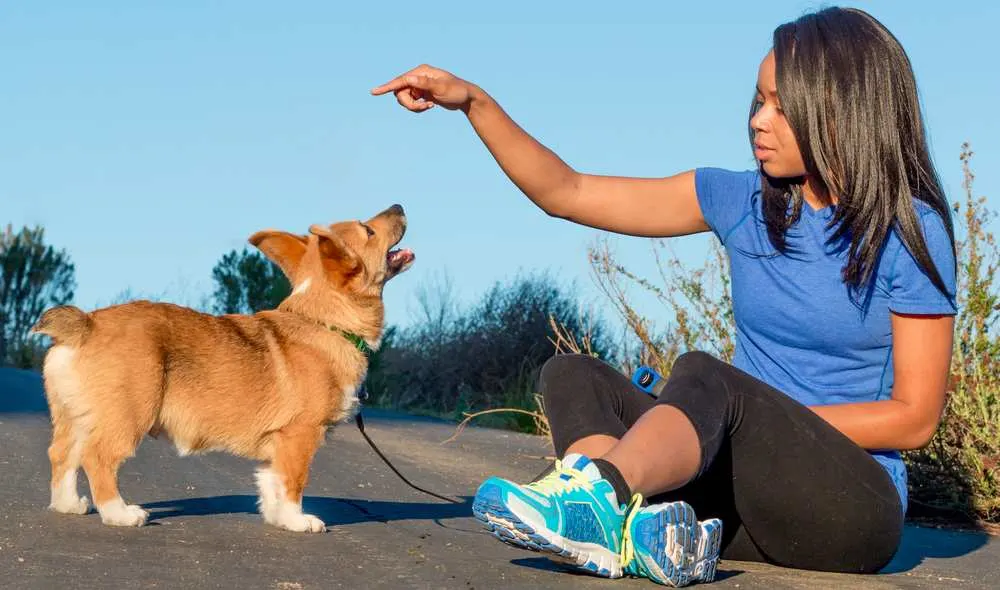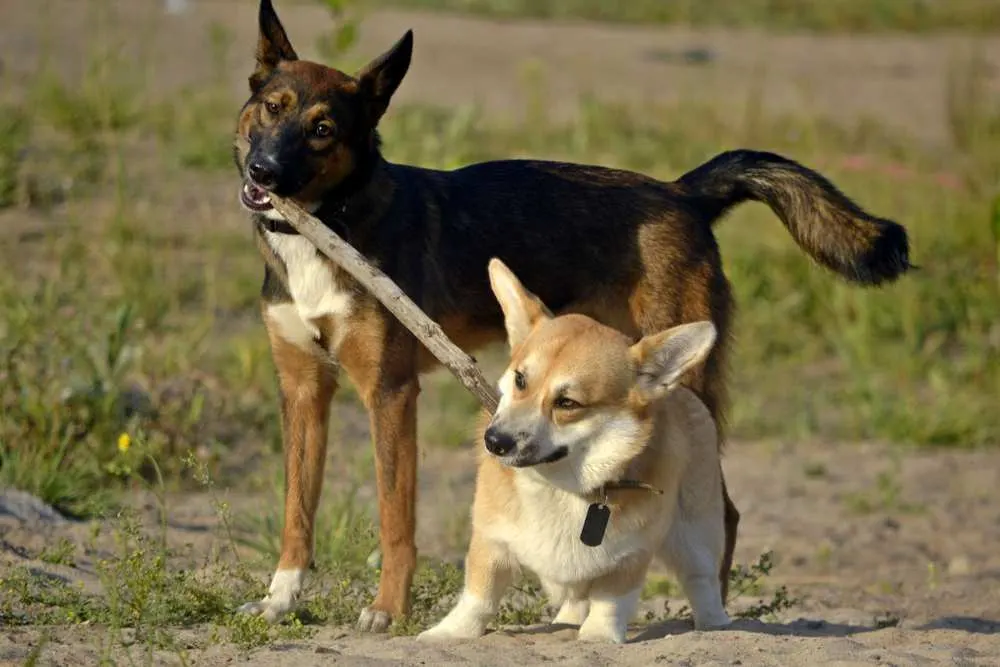Corgis, possibly the cutest dog breed in existence. But sometimes, cuteness can hide some other, less desirable traits.
You might have heard that corgis tend to be aggressive, more so than some other dogs. You might have a corgi that is showing clear signs of aggression, and you’re looking to read up on the topic.
Whatever the case may be, you’ve come to the right place.
In today’s article, we’ll discuss whether corgis are as aggressive as some internet users might lead you to think. This article is both for those that are looking to get a corgi and for those that have one or two already.
If your Corgi isn’t showing signs of aggression right now, it’d be smart to ensure that remains the case.
Let’s get into it.

Are Corgis An Aggressive Breed?
The answer to this one isn’t so straightforward. Not all corgis are the same. There are a few things that we have to take into account.
The first one and possibly the most important one are the genes. Very detailed research was conducted by four American universities that concluded that dogs’ personality traits are sixty to 70 percent dependent on their genes.
If your pup’s parents were calm and collected, as much as corgis can be, then it is somewhat safe to assume that your corgi will be relatively the same.
However, another thing to take into consideration is how the dog grew up. It could have had the most mellow parents in the world; if it ended up on the street or with abusive owners, it’s going to show some severe signs of mental distress.
All that being said, there are certain traits that almost all corgis possess. Before we go into those, we have to differentiate between the two species of corgis.

The Pembroke and The Cardigan
We’ve provided a picture that will help you recognize which one’s which.
They are different from each other, both physically and psychologically.
Cardigans are the older breed among the two by around two thousand years. Their fur is darker, and they’re larger compared to their Pembroke counterparts. However, without both of them next to each other, the difference in size is negligible.
Pembrokes have lighter colored fur and are more popular among the two. That might be the queen of England’s fault, but we’ll never know.
What both of them have in common is that they’re herding dogs through and through.
Just as they’re somewhat different visually, they’re also different on the inside.
Pembroke corgis are machines on four legs. They’re full of energy and are always looking for a new challenge. Always ready to adapt and please their owners, but also prepared to retaliate if they’re left alone for too long.
Cardigans, on the other hand, are more relaxed. They’re often okay with a walk around the block and a decent routine that isn’t too boring but also not an action movie.
Both of them are highly intelligent dogs. Their herding heritage means both of them require some training, at least on a weekly basis.
They learn tricks quickly and require a fair amount of new challenges. If you fail to properly train your corgi, they can become too bossy, but more on that later.
Now, let’s delve a little deeper into corgi temperament and see what we may find.
As we said, not all corgis are the same. Although most of them share a lot of traits, at the end of the day, it all comes down to the individual dog.

Are Corgis Aggressive With Other Dogs?
They can be.
Corgis can be very territorial. If an unfamiliar dog enters their territory, corgis don’t shy away from showing who’s the boss.
They were herding dogs; after all, they had to control animals ten times their size; they can’t afford to have someone question their authority.
That being said, you, as the owner, have to show your corgi that you’re the boss.
If you already have a dog in your house, a corgi puppy should get along with it without too much fuss. On the other hand, if you want to bring a new puppy into your home and already have an adult corgi, some supervision is highly recommended.
Corgis will get used to another dog, or a cat, sharing their living space sooner or later. As long as you control the situation, everything should be fine.
However, if your corgi perceives an unknown dog or a stray as a threat, they’re likely to show aggression.
The best thing to do is have your corgi spend as much time as possible near other dogs when he’s still a puppy. This will ensure he gets used to being around other animals and doesn’t see them as a threat.
One unusual thing to consider is that corgis with their tails docked could be more prone to showing aggression than those with a regular tail.
The reason being is that tail is used as a major communication tool between dogs. It conveys social cues and even helps them spread their scent around.
Just a thing to keep in mind if you plan on getting a corgi since Pembroke corgis often have their tail docked for none other than esthetic purposes.

Are Female Corgis Aggressive?
Believe it or not, female corgis tend to be more aggressive than male corgis. They can have a very short temper, which causes them to act out in some ways.
As we mentioned, corgis don’t like unfamiliar dogs using their territory. A lot of female corgis won’t shy away from showing their discontent with a new pet.
Because of that, your female corgi will most definitely require a certain level of attention on a daily basis.
The plus side to that is how loyal and willing to please female corgis are since they appreciate the time you spend with them.

Are Male Corgis Aggressive?
Male corgis can be more mellow compared to their female counterparts. This is especially true for cardigan male corgis who don’t require as much attention as Pembroke female corgis.
That being said, male corgis might not be so enamored with you like the females tend to be. That might be a good thing for some people since not everyone has that much time to spend on their dog.
However, male or female, if you don’t plan on spending a decent amount of time with your corgi, then we don’t recommend getting one in the first place. There are a lot of breeds that might be better suited for your lifestyle.

Are Corgi Puppies Aggressive?
They certainly can be. This can depend a lot on the breeder.
When buying a corgi, or any dog for that matter, make sure you’re doing it from a trusted and certified breeder that knows what they’re doing.
As we said, genetics play a significant role. The apple doesn’t fall too far from the tree. A breeder with a comprehensive knowledge of their dogs is a great way to avoid needlessly aggressive dogs.
With all of that in mind, let’s see why corgis, adults or puppies, can be aggressive.

Reasons For Aggression
1. Fear
Most dogs, corgis included, tend to show signs of aggression if they’re afraid of something. Their first instinct is to protect themselves.
Although corgis are rarely fearful, some of them might have been abused and left to fend for themselves.
If you show anything else but kindness to such a dog before they’ve accepted you as the owner, they can feel threatened and start growling at you or even bite you.
That’s why it’s essential to know your corgi’s history and where they come from.
2. Herding Is In Their Genes
Corgis were explicitly bred for herding. That means they had to be bossy to do their “job” properly.
They would nip the ankles of the animals they were herding to keep all of them in as tight a circle as possible.
Since there are no more cattle around, they’re left with humans, even children, and other dogs.
This is why it’s crucial to teach your corgi from a very early age that biting people’s ankles isn’t okay.
Otherwise, you risk having a dog that still thinks it’s on the shiny pastures of Welsh.
3. They’re Not Getting What They Want
We said that corgis are highly intelligent, herding dogs. As such, they’ve developed a certain individualistic approach at times, where they feel entitled to some things.
As the owner, if you stop them from having that thing, they might show their frustration by being aggressive.
This is especially the case if they’re used to getting whatever they want, even when they were just little puppies.
We don’t recommend you respond to their inappropriate behavior by also being aggressive.
Definitely don’t try to hit them or yell at them; they can get even angrier. It would be best if you were stern but calm.
All of that being said, if a corgi isn’t getting the attention it requires, then it’s probably the owner’s fault that the corgi is aggressive.
They need attention. We mentioned that Pembroke corgis are full of energy, and if they’re locked up in the house the entire day, they’re not going to like it.
Learn More: Are Corgis Food Aggressive? Stop It In Time!
4. Something’s Wrong
Corgis are prone to suffer from hip dysplasia and intervertebral disc disease. This is often due to being overweight and not having the proper amount of exercise. Besides those common issues, tumors are also one of the reasons a dog might start being aggressive.
Suppose you’ve been following all the necessary guidelines.
Your corgi is not overweight; they have a sufficient amount of exercise; they’re not being mistreated, and have a decent social life. Then they really shouldn’t show signs of aggression, at least not regularly.
However, if they do, you should definitely take your corgi to a vet to be checked out. These things can be severe and can significantly reduce your corgi’s lifespan.
Tips On Dealing With An Aggressive Corgi

Hire A Professional
The first thing to establish is that some level of aggression is more or less unavoidable. Don’t worry if your pup is being a bit bossy from time to time.
However, if your corgi starts growling, taking a dominant stance, and showing clear signs of aggression, you shouldn’t get angry at them.
Chill out, take control of the situation by showing your corgi there’s nothing to worry about. They’re bound to relax and go back to being their cuddly self. Head over here if you want to learn more about how to stop aggression in Corgis.
At that point, it’s on you to decide whether you want to hire a professional to help you out with dealing with your corgi.
We said that some level of aggression is inevitable. Still, it’s not very pleasant to have an unpredictable dog capable of hurting others.

Prevention Is Better Than Cure
This is the best tip we can give to new corgi owners.
If you don’t want your corgi to be too aggressive, you have to give it a fulfilling life.
When they’re young, have them spend time with as many dogs as possible. Unless you want your corgi to be a guard dog, it needs to socialize with other puppies.
When their growth plates close, figure out an exercise plan that will keep them from getting bored.
A walk around the block every day is not going to cut it. Give them challenges that will tire them out both physically and mentally.

Wrapping It All Up
Alright, we’ve covered quite a bit. Let’s quickly summarize and give our final thoughts.
Corgis can be aggressive. Some level of aggression is inevitable, but it shouldn’t be anything to worry about.
The most important thing is to show them who’s the boss from the beginning. Otherwise, they might start acting like one.
If a corgi shows signs of aggression regularly, it could be either because of fear, their herding DNA, them not getting what they want, or they might have a health problem.
It’s on the owner to figure out what’s causing their corgi to act out.
Keep in mind, don’t try to discipline your corgi by lashing out on them; it’s not going to end well.
All in all, corgis are great dogs, highly intelligent, and loyal. If you’re willing to spend the necessary amount of time with them, they certainly won’t disappoint.
Like with all dogs, genes play a big part. Don’t go for the first breeder you find online, do your research, and make sure your corgi is coming from a good home.
As long as you give your corgi a fulfilled life, everything should be fine.

